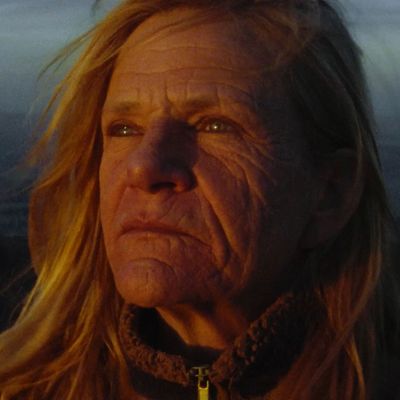
A woman waits by herself in a camper beside a lake surrounded by what seems like dry, empty land. By day, she reads an Audubon guide to birds; by evening, a guide to the stars ÔÇö and it seems sheÔÇÖs been there a while, because she has memorized the birdcalls and the starsÔÇÖ places in the night sky. The woman, named Faye and played by veteran character actress Dale Dickey (WinterÔÇÖs Bone, Unbelievable), subsists on crawdads she has caught herself and listens to the radio. Every once in a while, a young man on a bike brings by the mail, and she becomes briefly excited that something might have arrived for campsite No. 7. Usually, nothing has.
Then, one day, someone arrives: Lito (played by Wes Studi), the man she has been waiting for. TheyÔÇÖve known each other since they were kids but havenÔÇÖt seen each other in ages. Not quite old flames ÔÇö they talk of a hesitant attempt at a kiss a long time ago ÔÇö both were married to others at one point. But now that their significant others have died, they have arranged, in their own shy and uncertain way, to meet up again by this quiet lake.
Like a coy, concise short story you might remember having read years ago, A Love Song is the simplest of tales, but thereÔÇÖs a complex universe of longing contained within it. Most of it comes thanks to its two stars ÔÇö two of our greatest supporting actors getting the rare chance to take center stage. Dickey and Studi are renowned for their tough demeanors, but here, thanks to the attentive, lingering patience of director Max Walker-Silverman, we see genuine tenderness. (ItÔÇÖs a shame that mainstream cinema has trained us to think of such human and familiar faces as tough, weathered, even menacing ÔÇö or, as Dickey herself once put it, ÔÇ£mean and hard.ÔÇØ)
Tenderness and hesitation. Neither Faye nor Lito knows what to do next once theyÔÇÖve met back up, and as they gently dance around their feelings, we get glimmers of their past lives. ThereÔÇÖs very little exposition or backstory in A Love Story, but thereÔÇÖs just enough of it ÔÇö a word here, a memory there ÔÇö that the two central characters come through as real people, relatable yet mysterious. As we watch them, we may start to sense that weÔÇÖve caught Faye and Lito at transitional points in their lives. Neither really knows what their next act holds. They donÔÇÖt even know if theyÔÇÖll be together. At one point, they play music together, and for a second, their reunion feels fleeting and glorious.
The setting plays an important role here, clearly. That the film takes place at a campsite ÔÇö a point of temporary stasis ÔÇö makes some metaphorical sense. Early on, Faye is clearly in a holding pattern ÔÇö her life shorn of anything extraneous or permanent. She even lets a family of cowboys take the engine out of her pickup after theirs goes bust; thatÔÇÖs not a sign that she intends to stay but, rather, that she doesnÔÇÖt know what to do with herself. Later, as she and Lito sit atop a small overhang, their legs dangling in the air, they remember that the lake used to reach all the way to that spot. The changing land echoes the changing people ÔÇö and vice versa. ItÔÇÖs all supremely touching and evocative without ever feeling too on-the-nose or heavy-handed.
A Love Song may not be perfect. At times, Walker-Silverman goes for an arch, deadpan, posed style that suggests he has spent plenty of time with the independent cinema of the 1980s and early ÔÇÖ90s, but it doesnÔÇÖt feel entirely in line with the highly lived-in, naturalistic performances of his two leads. Still, this adds to the handmade, modest charm of the film. Besides, the director knows what heÔÇÖs got with these two actors, and he wisely lets them take over the screen whenever possible. This approach pays off beautifully. A Love Song is a small gem.
More Movie Reviews
- Julianne Moore and Tilda Swinton Are Perfectly Imperfect Together
- Tyler PerryÔÇÖs Cosplay of a War Movie Hardly Does Its Subjects Justice
- Jim Carrey (and Jim Carrey) Elevate Sonic the Hedgehog 3


